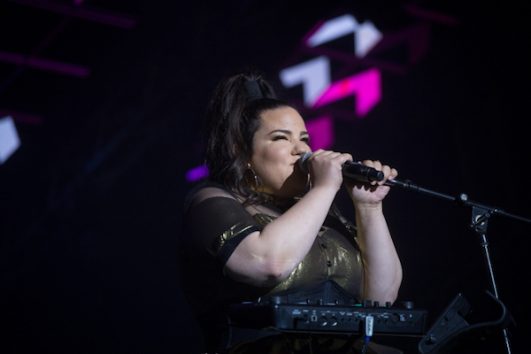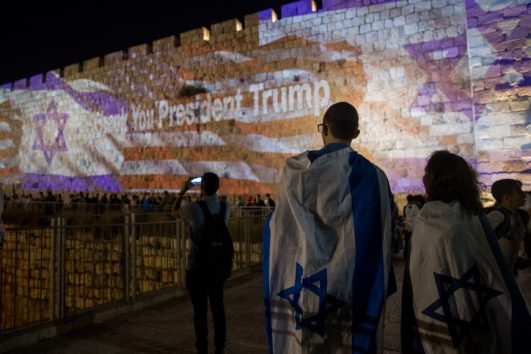Gambino’s new music video illustrates why audiences should focus on the injustices unfolding in the background of artistic performances – especially those representing the state.

In the music video for his new single “This is America,” the singer and rapper Childish Gambino (Donald Glover) dances in a warehouse while scenes of violence and chaos unfold around him. Among other messages, the video is a reflection of how art can be used to distract people’s attention from the brutal realities faced by Black Americans and other people of color in the United States. Gun murders, police sirens, running youths, and other images fill the background as Glover smiles and performs for the camera, trying to keep the audience’s gaze on him. “We just wanna party,” he sings, before pulling out a pistol and shooting a hooded man in the head. “This is America,” he says, and continues dancing.
Glover’s video rang through my mind when I heard that Netta Barzilai had won the Eurovision contest on Saturday night. Barzilai is a talented and charismatic singer, and her performance arguably deserved the popular vote. But like many Palestinians, I could not help but feel frustrated, even hopelessness, after hearing the news of her victory.
The idea that art and culture can be separated from their political context is a naïve luxury that oppressed people cannot afford. This is especially the case with an event like Eurovision, where countries routinely manipulate their candidates’ performances to boost their public image and deliver political messages. As the world’s eyes fixated on Barzilai raising her award in triumph, it seemed like the violence that had transpired in Israel-Palestine that week, like those in Glover’s video, had gone completely unnoticed.
A day before her win, Israeli snipers opened fire on Palestinians in Gaza as they marched in protest toward the fence for the seventh week in a row. In the weeks prior, Israeli settlers in the West Bank vandalized the homes and properties of Palestinian villagers – attacks which have spiked in recent months. To the north in Syria, Israeli and Iranian forces faced off in the wake of President Trump’s withdrawal from the JCPOA – a goal long-pursued by Prime Minister Netanyahu. On Saturday, right-wing Israelis chanted racist slogans as they marched through the Old City to celebrate the 51st year of its conquest. On the eve of Nakba Day, the new U.S. embassy opened its doors for business, further erasing the corpse of the two-state solution.
Barzilai became the latest trophy in this public relations streak for the Israeli government. Her acceptance speech, in which she joyfully cried “Next year in Jerusalem!” (where the 2019 Eurovision may be held) added further cause for the city’s nationalist euphoria. Landing in Tel Aviv on Monday, Barzilai declared: “This is a great moment for me, for the [Israeli] delegation and for the country. I am happy that we managed to create a reason for joy in a country that does not have a lot of reasons to celebrate.” By the time she went on stage in Rabin Square that evening, 58 Palestinians had been killed and 2,700 injured by Israeli snipers along the Gaza fence.
Glover’s video resonated with this stark national dissonance. In the U.S., the illusions of artistic vibrancy and cultural diversity frequently conceal the racism, police brutality, mass incarceration, and other oppressive systems that preserve white privilege and discriminate against Black Americans and people of color. Despite their “freedoms” and supposed social progress, they still find that “You just a Black man in this world, you just a bar code.”

The same illusions and contradictions exist in Israel. Few Israelis (or Europeans) want to think about the occupation that privileges their society at the expense of another. Few want to confront how they can celebrate a singer who honors the #MeToo movement against sexual assault and harassment, and at the same time, openly endorse or ignore a military regime that violates the bodies, rights, and dignity of an entire people living right at their doorstep.
Palestinians and allies who raise these social critiques are blasted as being cruel and petty. They are expected to be compliant, if not grateful, with their existence as second-class subjects to such an “enlightened” and “diverse” nation like Israel. At best, they are told to stop spoiling the party, and to tolerate their oppressor’s success and embracement by the world.
However, instead of being distracted by these shows – especially those sponsored by and representing the state – audiences ought to turn their gaze to the injustices unfolding in the background. It is true that Israelis, like any other people, “just wanna party” and have normal lives. But their freedom to do so comes at the direct cost of another people’s freedom, and their complicity in covering up that system must be challenged. If we can praise artists like Glover for highlighting these unacceptable realities in the US, we should also do so with the artists and critics who do the same with Israel.
This article has been further edited since initial publication.

